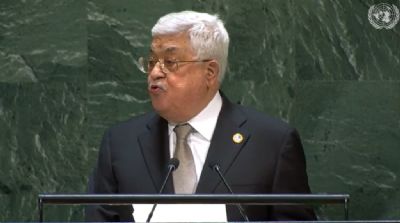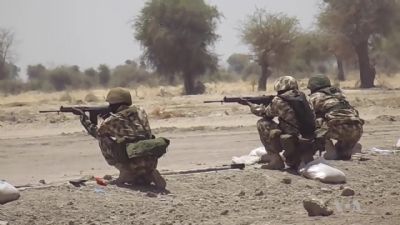Share
What's New
Resources updated Monday, November 30, 2020
November 30, 2020

"For at least the last five decades, the United Nations General Assembly has been blindly passing Palestinian-engineered resolutions supposedly aimed at addressing the 'question of Palestine.' Lacking in imagination and not really asking or answering any relevant question at all, what has now become known as the "Palestinian package" is not only detached from reality, but uses language so loaded in favor of the Palestinian narrative that it serves only to fan the flames of conflict, instead of diffusing them.
Linguists have long understood the power of language to make or break a conflict. Now, it's time for global leaders-and particularly, their representatives on the world stage in New York-to take a closer look at their own deeds and the language they use, if they stand any chance of positively influencing the world's most closely scrutinized regional conflict.
One-sided language began to dominate in U.N. forums almost as soon as Israel was recognized by the Partition Plan vote on November 29, 1947. Arab countries rejected that vote and, in an effort to appease them and, later, the Palestinians, member states now robotically support proposals that undermine my country's legitimacy. In the process, they also erase 3,000 years of Jewish history in Jerusalem...."
U.N. 'Palestinian Package' of Resolutions Only Fans the Flames of Conflict Article

Suspected members of the Islamic militant group Boko Haram killed at least 40 rice farmers and fishermen in Nigeria as they were harvesting crops in the country's northern state of Borno, officials said. One said the death toll could rise to about 60 people.
The attack Saturday in a rice field in Garin Kwashebe came on the same day that residents were casting votes for the first time in 13 years to elect local councils, although many didn't go to cast their ballots.
The farmers were reportedly rounded up and summarily killed by armed insurgents in retaliation for refusing to pay extortion to one militant.
Malam Zabarmari, a leader of a rice farmers association in Borno state, confirmed the massacre to The Associated Press, saying at least 40 and up to 60 people could have been killed.
Nigerian President Muhammadu Buhari expressed grief over the killings.
"I condemn the killing of our hardworking farmers by terrorists in Borno State. The entire country is hurt by these senseless killings. My thoughts are with their families in this time of grief," he said.
Buhari said the government had given the armed forces everything needed "to take all necessary steps to protect the country's population and its territory."
A member of the House of Representatives, Ahmed Satomi, who represents the Jere Federal constituency of Borno, said at least 44 burials were taking place Sunday.
"Farmers and fishermen were killed in cold blood. Over 60 farmers were affected, but we only have so far received 44 corpses from the farms," the lawmaker said.
Boko Haram and a breakaway faction, the Islamic State West Africa Province, are both active in the region. Boko Haram's more than decade-long insurgency has left thousands dead and displaced tens of thousands. Officials say Boko Haram members often force villagers to pay illegal taxes by taking their livestock or crops but some villagers have begun to resist the extortion.
Satomi said the farmers in Garin Kwashebe were attacked because they had disarmed and arrested a Boko Haram gunman on Friday who had been tormenting them.
"A lone gunman, who was a member of Boko Haram came to harass the farmers by ordering them to give him money and also cook for him. While he was waiting for the food to be cooked, the farmers seized the moment he stepped into the toilet to snatch his rifle and tied him up," he said.
"They later handed him over to the security. But sadly, the security forces did not protect the courageous farmers. And in reprisal for daring them, the Boko Haram mobilized and came to attack them on their farms."
Insurgents also torched the rice farms before leaving, he said.
Suspected Boko Haram terrorists kill at least 40 farmers in Nigeria Document
